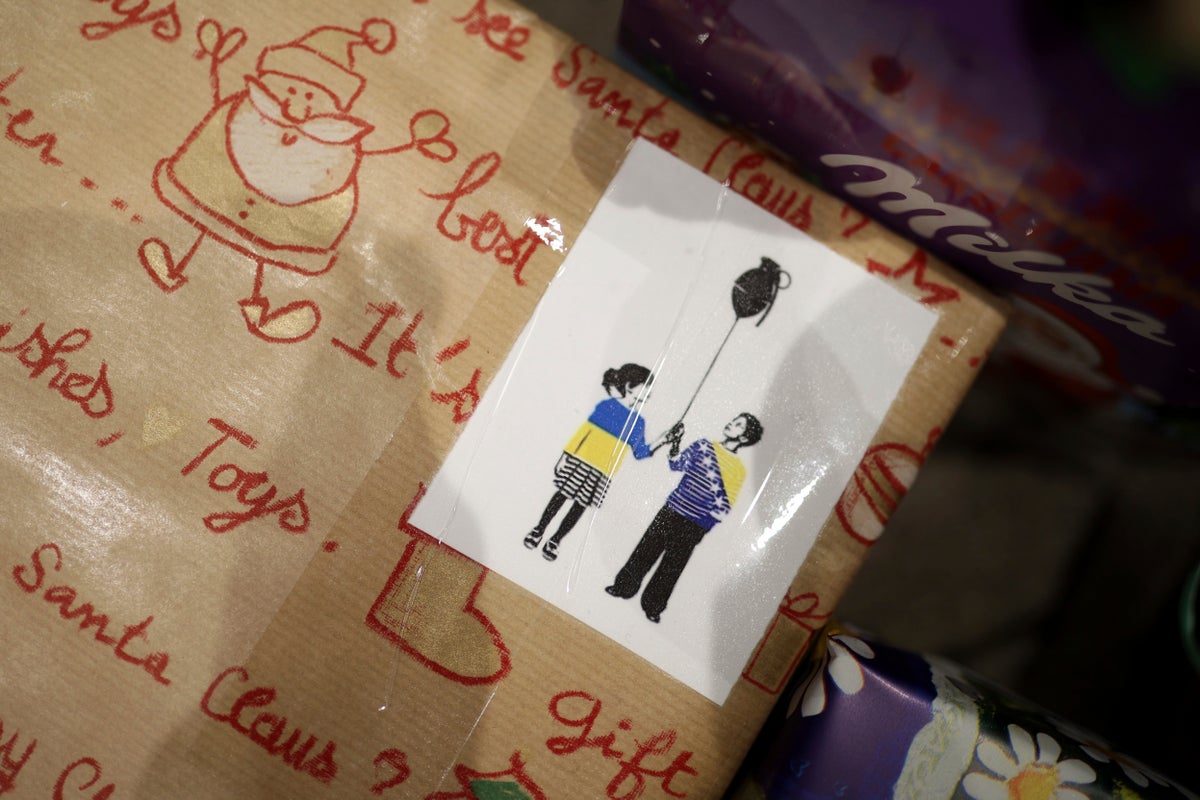
In homes and schools around Bosnia, youngsters this December have been preparing gift boxes they hope will put a smile on the faces of their peers living through war in Ukraine — just as such gifts did for many of their parents a generation ago.
Responding to an appeal launched by a small Sarajevo museum, hundreds of Bosnian children have been filing small boxes with warm clothes, toys, candies and other simple gifts to be delivered to the children of Ukraine in time for the New Year.
For parents and educators who are helping them select what to send, the experience has awakened rare happy memories from the time when they were on the receiving end of the kindness of strangers while growing up in constant fear of death.
“When I told my dad that we will prepare gifts for children in Ukraine, he told me how happy such gifts had made (him and his friends) feel when they received them,” during the Bosnian war, said Sara Nur Spahic while helping label the gift boxes for Ukraine that have been steadily piling up in recent weeks in her primary school in Sarajevo.
“I hope the children in Ukraine will be equally happy,” the 11-year-old added.
Bosnian Serb forces laid siege to Sarajevo in the early 1990s, during the bloody break-up of Yugoslavia. Some 350,000 people were trapped, for 46 months, in their city, subjected to daily shelling and sniper attacks and cut off from regular access to electricity, food, water, medicine and the outside world. More than 11,000 people — over a half of them civilians — were killed during the siege. Countless others were wounded.
As many children in Sarajevo and elsewhere in Bosnia grow up listening to their parents’ stories of a childhood spent in war, they easily empathize with their “unknown friends” in Ukraine, said veteran educator Elvira Velic-Muftic.
The children in Savfet Beg Basagic primary school in Sarajevo, where Velic-Muftic works as the school counselor, appeared to prove her right.
“I believe that receiving these gifts will make the children (in Ukraine) much happier because they will know that someone is thinking of them,” said Asja Ibrahimovic, 11, while helping her classmates sort by size a pile of nicely wrapped boxes.
“We had to have in mind to choose the things that can be easily carried because the children in Ukraine and their families often must flee their homes within minutes after hearing the sound of air raid sirens to seek shelter in basements and subway stations,” said Tarik Kulenovic, 11. Kulenovic stuffed his gift box with chocolate bars and light toys. Warm woolen hats and gloves, along with notebooks and crayons also featured prominently among the gifts prepared by his classmates.
Helping her current charges assemble their gift boxes “transported” Velic-Muftic into the 1990s, when she joined a local volunteer effort to educate tens of thousands of children who remained trapped in Sarajevo.
“I was in a position to distribute to my kids the gift boxes sent to them by children from all around the world. The joy on their faces, the feelings those gifts had provoked are something one can never forget,” Velic-Muftic said.
It was that momentary feeling of joy that the War Childhood Museum hoped to provide for the children in Ukraine when it launched its gift drive in Bosnia in the early days of December, its founder and director, Jasminko Halilovic, said.
Established in 2017, the museum collects and preserves personal items and testimonies from children affected by the 1990s Balkan wars. Included in its collection is an array of gifts donated by the people who had received them from strangers while growing up in wartime Bosnia. Halilovic said the museum was inspired by its collection “to do something good...to allow (Bosnians) to do something for children of Ukraine.”
Mirela Geko, a member of the museum staff, received a gift box in 1993, when she was 5, from an unknown 7-year-old Bosnian refugee living in Denmark. Her “box of wonders," Geko recalled, included what she felt were “the best, the most beautiful presents” — a notebook, crayons and pencils, and a sweet-tasting toothpaste for children.
“It made me unbelievably happy, as if the war had stopped for a moment and only wonderful things were happening to me,” she said.







